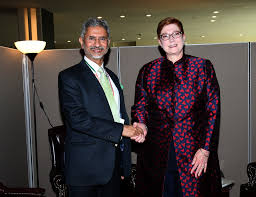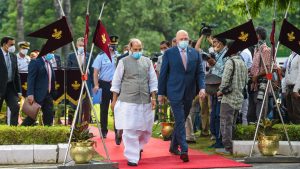
Moving the relationship beyond cricket and curry, India and Australia are poised to hold the inaugural 2+2 dialogue between their foreign and defence ministers in New Delhi that will focus on injecting greater strategic content into the multi-faceted bilateral partnership.
The 2+2 dialogue between India’s External Affairs Minister S. Jaishankar and Defence Minister Rajnath Singh with their Australian counterparts, Foreign Minister Marise Payne and Minister of Defence Peter Dutton will focus on enhancing counter-terror cooperation, interoperability between navies, collaboration between defence industries, cyber security, critical technology and supply chains.
“These inaugural 2+2 discussions are a cornerstone of the Australia-India Comprehensive Strategic Partnership, which is founded on a shared commitment to a secure, stable and prosperous Indo-Pacific region,” said Ms. Payne ahead of the four-country tour, which includes a trip to India.

The changing dynamics in Afghanistan in the wake of the sudden Taliban takeover on August 15 and the formation of a new government in Kabul will figure prominently in 2+2 discussions. Ahead of the dialogue, Australian High Commissioner to India Barry O’Farrell voiced Canberra’s concerns that the new regime created by the Taliban in Afghanistan is not inclusive and includes UN-sanctioned members of the Haqqani Network.
Australia is also working with its partners to ensure a “joined up approach in any engagement with the Taliban”, he said, adding that the current focus is on ensuring that the Taliban permits the safe passage of Australian and other citizens who wish to leave Afghanistan. Australia has evacuated around 4,100 persons from Afghanistan in the wake of the Taliban takeover.
“The Australian government is deeply disappointed by the lack of inclusion in the government’s make-up, particularly the fact that there are no women, no representatives of the [Shia] Hazara community or other ethnic groups, no members of the previous government and two members of the Haqqani [Network], which is a listed terrorist organization,” said the Australian envoy.
Common Concerns
India has similar concerns about the new Taliban-led interim government, which despite global pressure remains all-male and Pashtun-dominated. The two strategic partners are expected to join hands in calling for a broad-based inclusive government in Kabul and ask the new regime in Kabul to ensure that the Afghan territory is not used for terror attacks. The composition of the new Taliban government has stirred deep anxiety among India’s diplomatic-security establishment. Anti-India Islamist hardliners like Sirajuddin Haqqani, the suspected mastermind of the 2008 terror attack on the Indian embassy in Kabul, have been included in the Cabinet, exacerbating concerns in New Delhi that the Taliban-ruled Kabul, in league with Pakistan’s military-ISI, may escalate terror attacks against India.
The launch of the 2+2 dialogue is an important milestone in the burgeoning strategic partnership between India and Australia. “The 2+2 dialogue will deepen the India-Australia strategic partnership and enhance interoperability between the navies of the two countries,” Anil Wadhwa, former secretary (East Asia) in India’s Ministry of External Affairs and the author of the Australia Economic Strategy, told India Writes Network.
Quad Connect
The 2+2 dialogue will also be watched closely in Beijing as it will focus on promoting freedom of navigation, shaping an inclusive Indo-Pacific, and enhancing collaboration in the Quad – a four-nation grouping which is suspected by Beijing as a gang-up to contain China’s rise.
The intra-Quad cooperation will be high on the agenda as the 2+2 dialogue is taking place barely a fortnight before the first in-person Quad summit of the leaders of India, US, Australia and Japan in Washington. Both Prime Minister Narendra Modi and Australian Prime Minister Scott Morrison are expected to travel to Washington to join the Quad summit hosted by US President Joe Biden. Outgoing Japanese Prime Minister Yoshihide Suga will also join the first in-person Quad summit in Washington.
Author Profile

- Manish Chand is Founder and Editor-in-Chief of India Writes Network (www.indiawrites.org) and India and World, a pioneering magazine focused on international affairs. He is CEO, Centre for Global India Insights, an India-based think tank focused on global affairs.
Latest entries
 India and the WorldFebruary 17, 2026South-by-South: Focus on people-centric solutions at India AI summit
India and the WorldFebruary 17, 2026South-by-South: Focus on people-centric solutions at India AI summit India and the WorldFebruary 7, 2026Modi hails interim India-US trade deal, Goyal says no concessions made on agriculture
India and the WorldFebruary 7, 2026Modi hails interim India-US trade deal, Goyal says no concessions made on agriculture India and the WorldFebruary 2, 2026Trump announces trade deal with India, Modi ‘delighted’
India and the WorldFebruary 2, 2026Trump announces trade deal with India, Modi ‘delighted’ India and the WorldJanuary 31, 2026Palestinian minister bats for mediatory role for India in ending Gaza conflict
India and the WorldJanuary 31, 2026Palestinian minister bats for mediatory role for India in ending Gaza conflict







